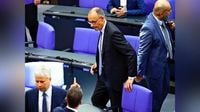On May 6, 2025, the German Federal Diet (lower house) conducted a historic first vote for the election of the Chancellor, marking a significant moment in post-war German politics. Friedrich Merz, the leader of the conservative Christian Democratic Union (CDU), was widely expected to secure the position but fell short of the necessary majority, receiving only 310 votes out of the required 316. This unprecedented outcome has raised concerns about the stability of the current coalition government and the future direction of Germany.
The vote, which was held in a chamber of 630 members, revealed deep divisions within the ruling coalition, which comprises the CDU/CSU and the center-left Social Democratic Party (SPD). The coalition holds a combined total of 328 seats, indicating that at least 18 members from these parties defected during the voting process. The result was a shock to many, as it is the first time since World War II that a Chancellor has not been elected in the first round of voting.
Lower House Speaker Julia Klekner announced the results amidst a tense atmosphere, with Merz displaying a stern expression as he learned of the outcome. Following the announcement, the Diet temporarily adjourned to allow party leaders to strategize their next steps. According to reports from NTV, the Diet is set to reconvene later that day at 3:00 PM local time (10:00 PM Japan time) for a second round of voting, which is mandated by the Basic Law to occur within 14 days.
Merz's failure to secure the necessary votes is believed to stem from a backlash against his recent shift towards a more conservative stance on immigration policies, particularly his collaboration with the far-right Alternative for Germany (AfD) party. This alliance, formed in January 2025, sought to tighten immigration regulations, which has sparked dissent among some SPD members and led to their defection during the vote.
Political analysts are closely monitoring the situation, with Holger Schmieding, chief economist at Berenberg in London, suggesting that while Merz is still likely to be elected Chancellor, the current circumstances indicate a lack of unity within the coalition, potentially undermining his ability to implement policies effectively. Carsten Brzeski, global head of macro at ING, echoed these sentiments, noting that not all CDU members are in agreement with the proposed fiscal policy changes.
Despite the setback, some political experts, including Harvard University's Philip Karker, predict that Merz will ultimately be elected Chancellor in the upcoming vote. However, he cautioned that the underlying tensions and conflicts already emerging could further damage inter-party relations, complicating governance moving forward.
The implications of this political turmoil extend beyond Germany's borders, as the nation grapples with significant challenges, including strengthening its defense capabilities and rebuilding its economy. The outcome of this election is crucial not only for Germany but also for the broader European landscape, as the nation plays a pivotal role in regional stability and security.
As the situation develops, there is growing concern regarding the impact on Germany's foreign policy, particularly in light of ongoing ceasefire negotiations concerning Russia's invasion of Ukraine. The Trump administration in the United States has been urging European nations to bolster their defense capabilities, placing additional pressure on Germany to respond decisively.
Meanwhile, Alice Weidel, co-leader of the AfD, commented on Merz's failure to be elected, asserting that the coalition's foundation is weak and questioning the viability of the current government. This sentiment reflects a broader unease among political observers about the potential for prolonged instability in German politics.
As the Diet prepares for the second round of voting, all eyes will be on Merz and the coalition's ability to rally support. While the prospect of his election remains, the challenges ahead are formidable, and the ramifications of this unusual voting outcome will likely be felt for some time.






